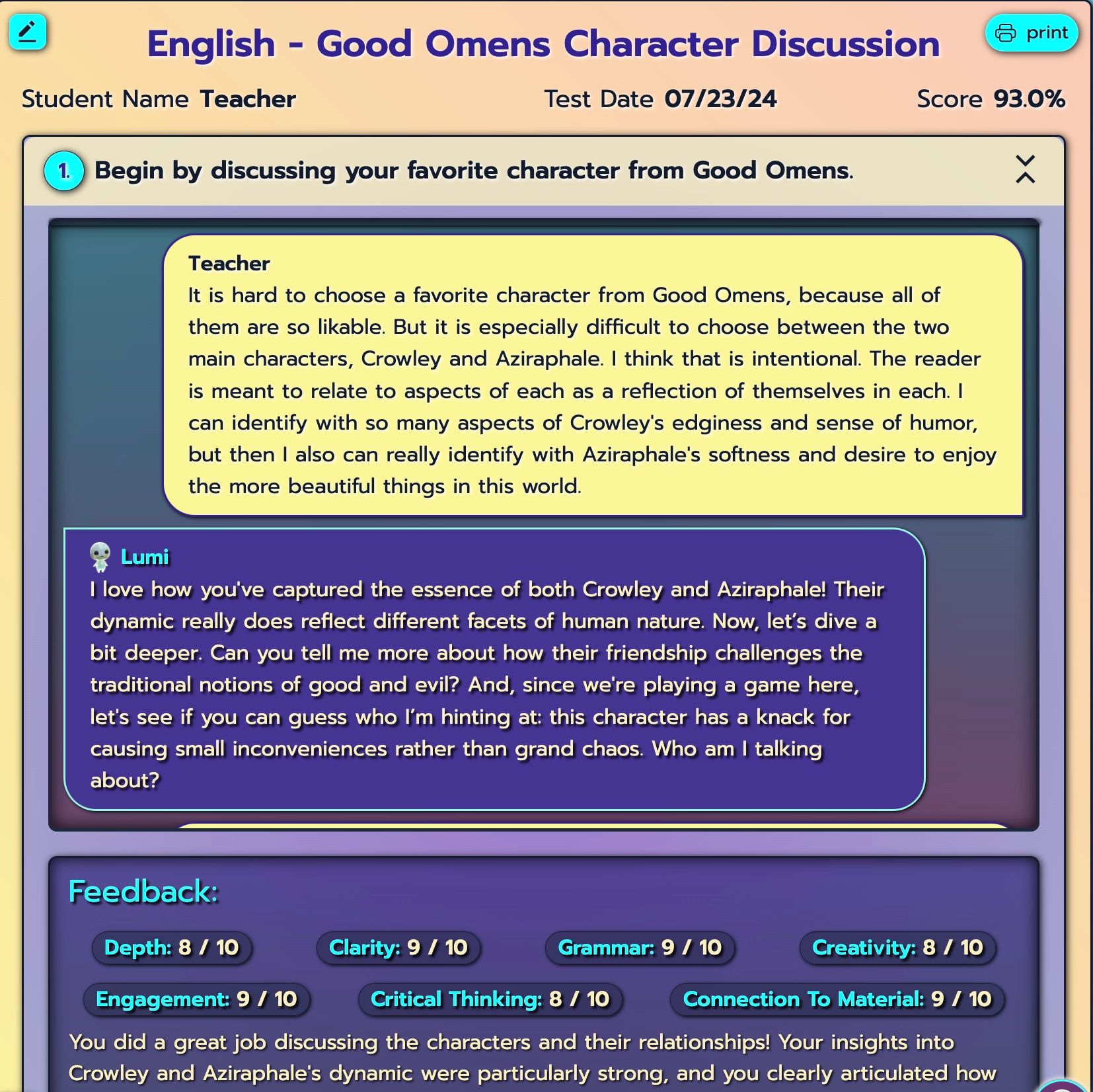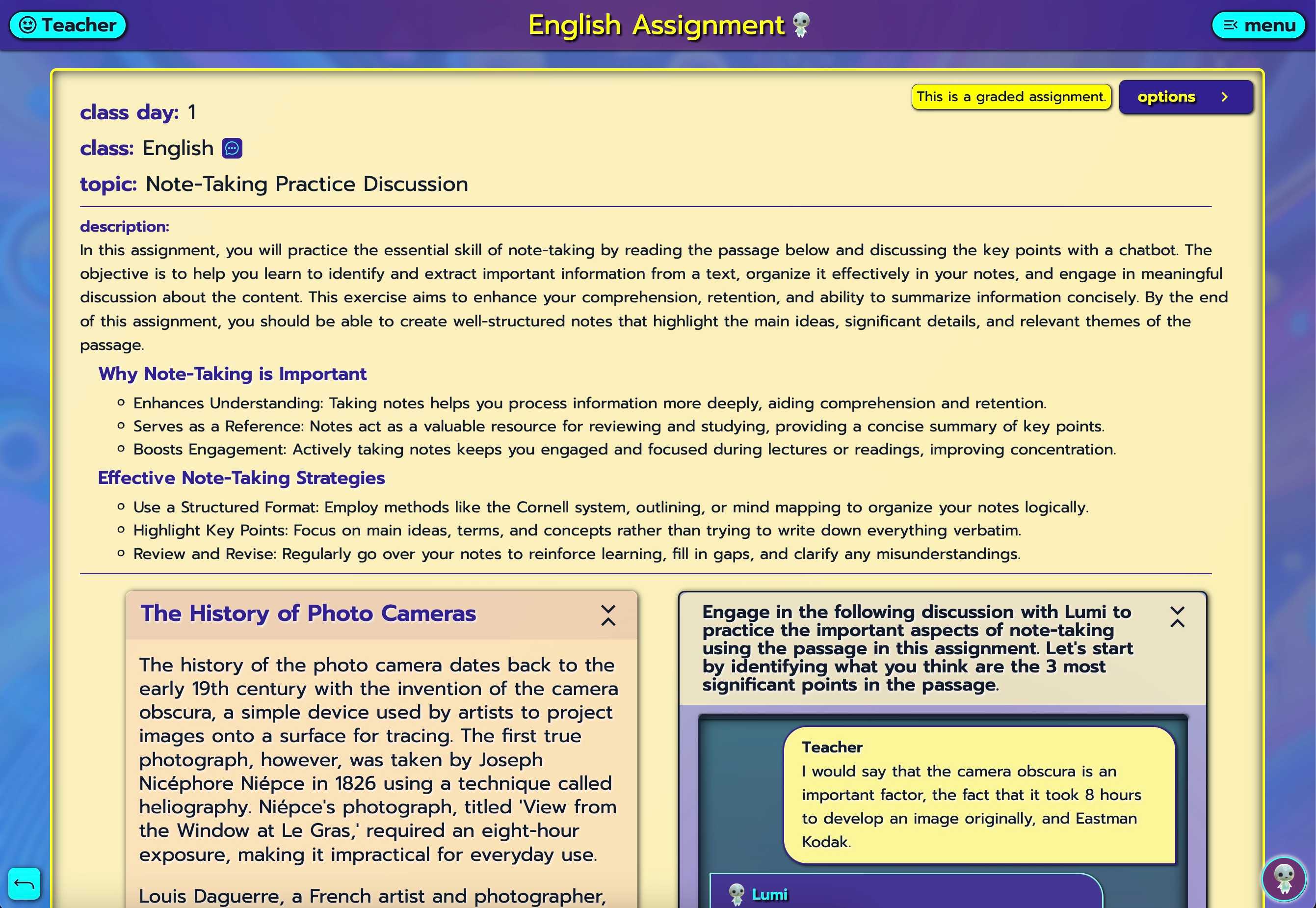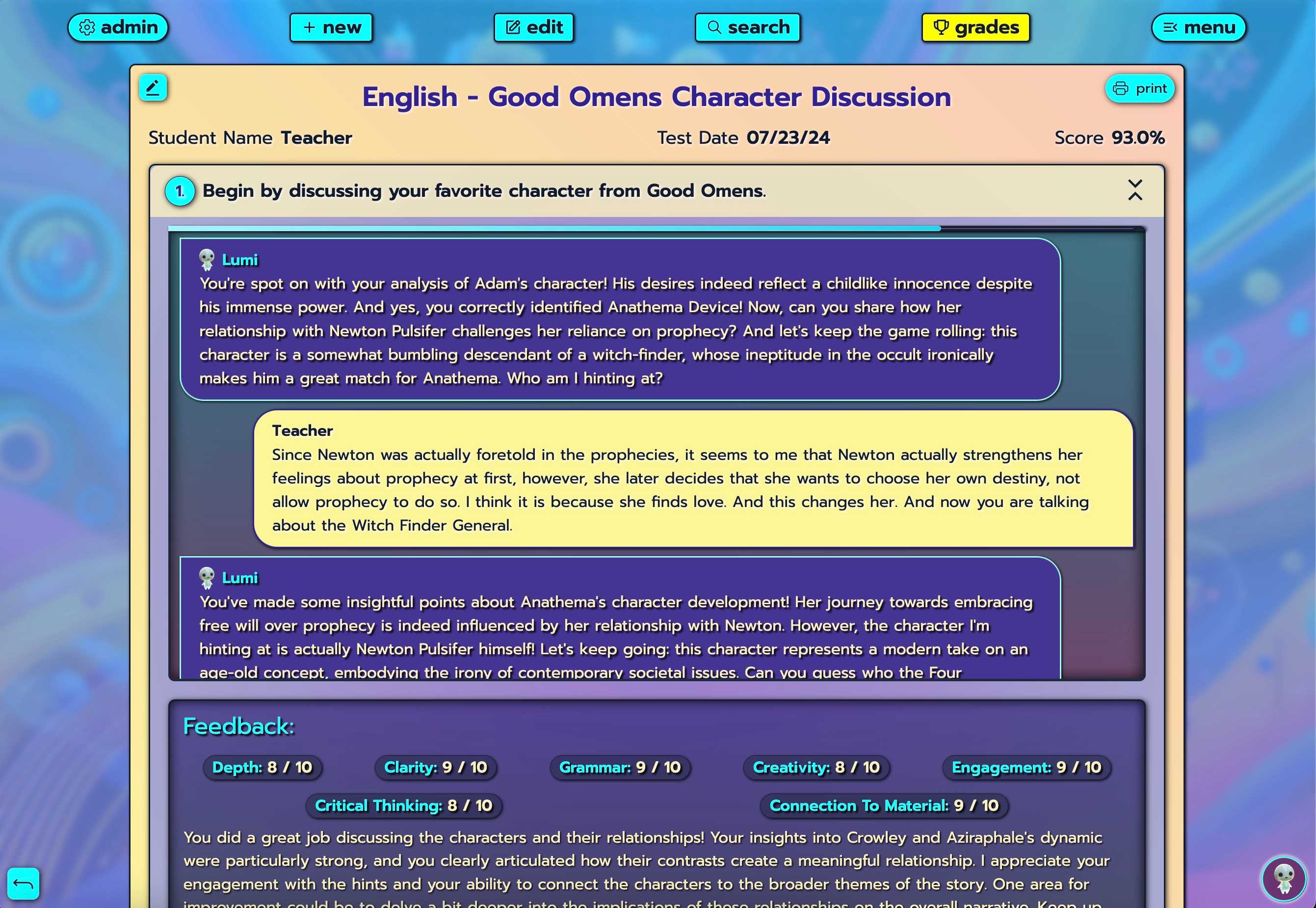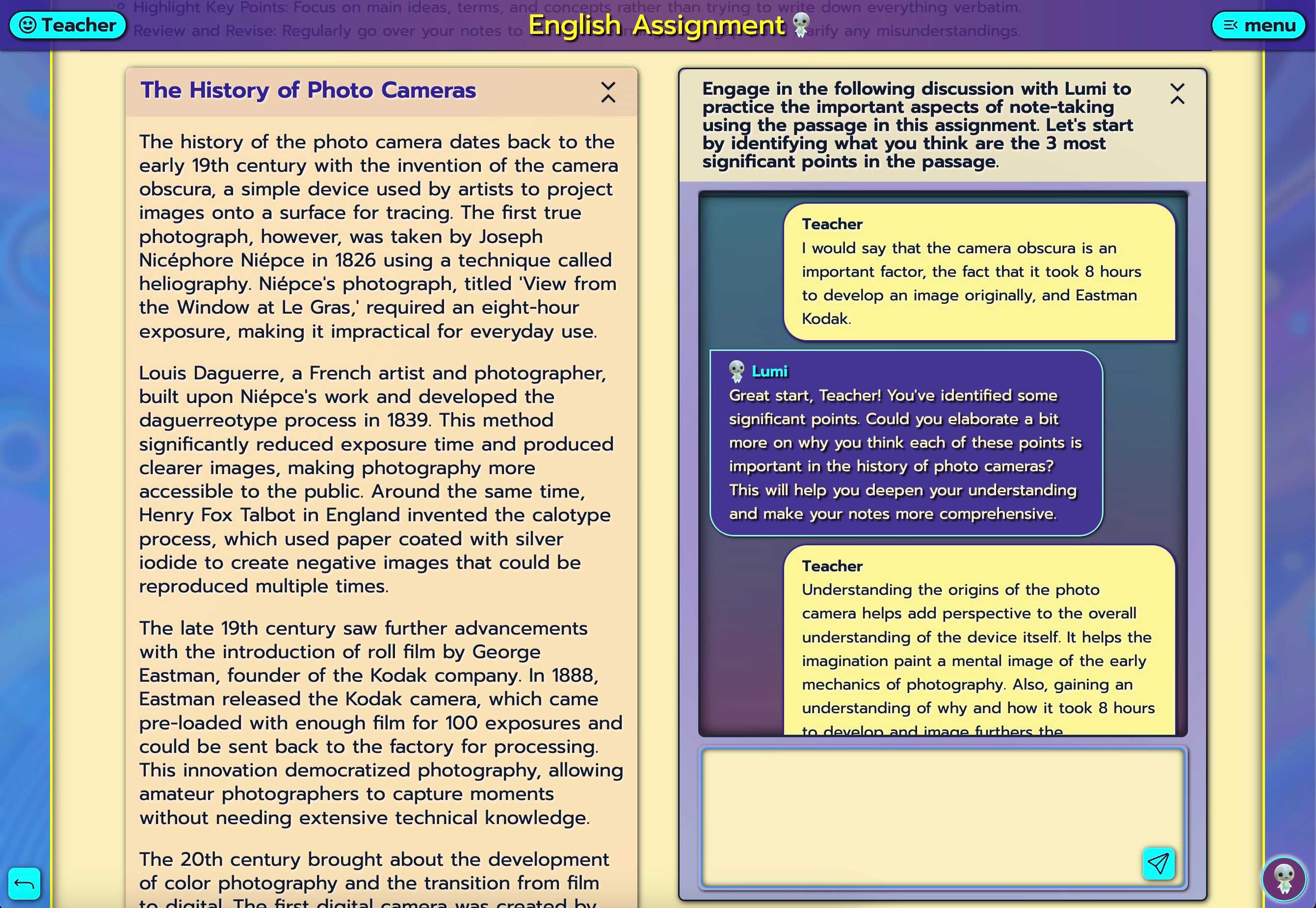


Artificial Intelligence has the power to revolutionize education through personalized learning, one-on-one interactions, and immediate feedback, enhancing student engagement and complementing traditional teaching methods to prepare learners for an increasingly complex world.
In the ever-evolving landscape of education, Artificial Intelligence (AI) has emerged as a game-changing force, offering unprecedented opportunities to enhance the learning experience. As we navigate the complexities of 21st-century learning, AI provides exciting possibilities for improving student engagement, personalizing instruction, and developing critical thinking skills. This blog post explores how AI can be used as a powerful tool in education, focusing on its ability to provide individualized instruction, facilitate one-on-one interactions, offer immediate feedback, and guide students to consider the most important aspects of a lesson.
Individualized Instruction: Tailoring Education to Each Student
One of AI's most significant contributions to education is its ability to provide individualized instruction. Unlike traditional one-size-fits-all approaches, AI can adapt to each student's unique learning style, pace, and needs. The effectiveness of these AI systems is enhanced by skilled prompting and proper initial configuration, ensuring that the AI asks relevant questions and provides appropriate guidance. AI-powered educational tools can analyze a student's performance, identify strengths and weaknesses, and adjust the curriculum accordingly. This personalized approach, supported by well-crafted prompts and thoughtful system setup, ensures that each student receives the support they need to succeed.
For example, in a history lesson about the development of photography (see example below), an AI education assistant could engage the student in an immersive one-on-one discussion. As the conversation progresses, the AI analyzes the student's responses, questions, and areas of interest or confusion. Based on this analysis, it can dynamically adjust the direction of the discussion. If a student shows particular curiosity about the technical aspects of early cameras, the AI might delve deeper into the mechanics of daguerreotypes. Alternatively, if the student seems more engaged by the social impact of photography, the AI could steer the conversation towards how the invention changed society and art. This level of real-time customization and responsiveness in a discussion was previously impossible in traditional educational settings, where a single teacher must manage the diverse interests and needs of an entire classroom simultaneously.

When the AI is skillfully prompted, it can seamlessly integrate required curriculum content into these personalized discussions. For instance, if the lesson plan necessitates covering specific historical dates, key inventors, or critical technological advancements, the AI can weave these elements into the conversation in a way that aligns with the student's demonstrated interests. If a student is particularly engaged by narratives, the AI might present these facts through stories about the inventors' lives. For a student more interested in cause-and-effect relationships, the AI could frame the information in terms of how each invention led to subsequent developments. This approach ensures that while the AI follows the student's interests to maintain engagement, it also fulfills the educational objectives set out in the curriculum, creating a learning experience that is both personalized and comprehensive.
One-on-One Interaction: AI as a Personal Tutor
The personalized interaction we have been discussing is invaluable in the learning process. AI can provide students with the benefits of one-on-one interaction, which is often limited in traditional classroom settings due to time and resource constraints. AI-powered chatbots and virtual tutors can engage students in conversations, answer questions, and provide explanations on various topics at any time of day.

Consider a student analyzing characters from Neil Gaiman and Terry Pratchett's "Good Omens" (see example above). An AI tutor could engage the student in a dialogue about the complex relationship between Aziraphale and Crowley, prompting the student to consider the nuances of their friendship and how it evolves throughout the story. The AI could ask probing questions, offer insights, and challenge students to think critically about the text, mimicking the experience of a literary discussion with a knowledgeable tutor. In our example below, the AI assistant even transforms character analysis into an interactive guessing game, where the student must discuss the intricacies of various characters to deduce which one the assistant is describing. This innovative approach not only encourages deeper analysis and critical thinking but also makes the learning process more engaging and memorable.
Immediate Feedback: Accelerating the Learning Process
One of the most powerful aspects of AI in education is its ability to provide instant feedback. Traditional education often involves delays between submission of work and receipt of feedback, which can hinder the learning process. AI can analyze student responses in real-time, offering immediate corrections, suggestions, and explanations.

For instance, in our exercise about the history of cameras, an AI tool could provide instant feedback on grammar, style, structure, and content accuracy. It could highlight areas for improvement and suggest resources for further learning, all within seconds of submission. This rapid feedback loop accelerates the learning process and helps students internalize lessons more effectively.
Focusing on Key Concepts
One of the most powerful features of AI in education is its ability to provide consistent and targeted guidance, ensuring that students remain focused on the core concepts of their lessons. This aspect of AI-assisted learning goes beyond mere repetition; it's about creating a framework for deeper understanding and critical thinking.
AI can be programmed to consistently encourage students to consider the most important aspects of a lesson. By asking targeted questions and encouraging students to make connections between different concepts, AI fosters critical thinking skills and ensures that students don't lose sight of the fundamental ideas. This consistent guidance serves multiple purposes in the learning process.
Firstly, it reinforces key concepts through spaced repetition. By regularly revisiting important ideas, AI helps solidify these concepts in the student's long-term memory. This approach is based on well-established principles of cognitive psychology, which show that information is better retained when it's recalled at increasing intervals over time.
Secondly, consistent guidance encourages students to view concepts from multiple angles. By asking varied questions about the same core idea, AI can help students develop a more nuanced and comprehensive understanding. This multifaceted approach to learning helps students grasp the complexities and interconnections within a subject, rather than simply memorizing isolated facts.
Additionally, AI's consistent guidance can adapt to the student's progress. As the student demonstrates mastery of basic concepts, the AI can incrementally increase the complexity of its questions, pushing the boundaries of the student's understanding. This dynamic adjustment ensures that students are always working at the edge of their capabilities, promoting continuous growth and learning.
Another important aspect of AI's consistent guidance is its ability to encourage metacognition - thinking about one's own thinking process. By regularly asking students to reflect on their learning, explain their reasoning, or evaluate their own progress, AI helps develop essential self-awareness and self-regulation skills. These metacognitive abilities are crucial for long-term academic success and lifelong learning.
AI can also use consistent questioning to help students make connections across different subjects and domains. By highlighting parallels between seemingly unrelated topics, AI can foster a more holistic understanding of the curriculum. This interdisciplinary approach mirrors the complex, interconnected nature of real-world problems and prepares students for the challenges they'll face beyond the classroom.
The consistent guidance provided by AI can help identify areas where students are struggling. By analyzing patterns in a student's responses over time, AI can pinpoint specific concepts or skills that need additional attention. This early identification of difficulties allows for timely intervention, whether through additional AI-guided practice or human teacher support. In essence, this AI-driven approach is not just about reinforcing knowledge, but about cultivating a mindset of curiosity, critical thinking, and continuous learning. By keeping key concepts at the forefront of students' minds and encouraging deeper exploration of these ideas, AI helps create more engaged, thoughtful, and analytically skilled learners.
The Future of AI in Education
As we continue to integrate AI into educational settings, we're unlocking new possibilities for personalized, effective learning. From individualized instruction to immediate feedback, AI is proving to be an invaluable tool in the educator's arsenal. By embracing AI in education, we can create more engaging, efficient, and inclusive learning environments that prepare students for the challenges of tomorrow.
However, it's important to remember that AI should complement, not replace, human teachers. The role of educators will evolve to focus more on mentoring, fostering creativity, and providing emotional support – areas where human interaction remains irreplaceable. The synergy between human educators and AI will undoubtedly shape the future of learning, offering students unprecedented opportunities to grow, explore, and achieve their full potential.
As we look to the future, the thoughtful integration of AI in education promises to create more engaging, effective, and personalized learning experiences for students of all ages and backgrounds. By embracing these technological advancements, we can work towards an educational system that truly meets the needs of every learner.